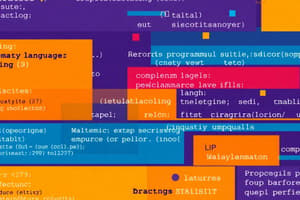Podcast
Questions and Answers
Which programming language is known for its efficiency, low-level memory management, and a wide array of applications?
Which programming language is known for its efficiency, low-level memory management, and a wide array of applications?
- C++ (correct)
- C
- Java
- Python
Which programming language supports object-oriented programming for more complex software development?
Which programming language supports object-oriented programming for more complex software development?
- Python
- Java
- C
- C++ (correct)
Which programming language is popular for developing web, enterprise, and mobile applications with its 'write once, run anywhere' philosophy?
Which programming language is popular for developing web, enterprise, and mobile applications with its 'write once, run anywhere' philosophy?
- Java (correct)
- Python
- C++
- C
Which programming language is known for its readability and simplicity?
Which programming language is known for its readability and simplicity?
Which programming language is primarily used for performance optimization and low-level systems programming?
Which programming language is primarily used for performance optimization and low-level systems programming?
Which language is known for powering interactive front-end applications on the web?
Which language is known for powering interactive front-end applications on the web?
What is a key benefit of using multiple languages in application development, as mentioned in the text?
What is a key benefit of using multiple languages in application development, as mentioned in the text?
Which language offers greater performance and versatility in data science according to the text?
Which language offers greater performance and versatility in data science according to the text?
What type of tasks is assembly language primarily used for in modern programming?
What type of tasks is assembly language primarily used for in modern programming?
Why is it important for developers to understand the nuances of different programming languages?
Why is it important for developers to understand the nuances of different programming languages?
Flashcards are hidden until you start studying
Study Notes
Unleashing the Power of Programming Languages in Computer Science
As computer scientists, we're obsessed with the endless possibilities of coding. From the intricate languages that power web pages to the ones that fuel artificial intelligence, programming languages form the backbone of our digital world. In this article, we'll explore a critical facet of computer science: the diverse array of programming languages and their unique applications.
The "No Search" Movement
The advent of tools like Bing Chat's "No Search" feature, allowing users to opt out of web searches, highlights the significance of programming languages. These tools illustrate how programmers can create solutions tailored to specific tasks, thus minimizing the need for web searches and enhancing efficiency.
The Alphabet Soup of Programming Languages
Programming languages can be categorized into several families, each with its unique strengths and applications.
C and C++
C and C++ are known for their efficiency, low-level memory management, and a wide array of applications. C++, in particular, supports object-oriented programming for more complex software development.
Java
Java is a popular choice for developing web, enterprise, and mobile applications. Its "write once, run anywhere" philosophy means it can run on various platforms.
Python
Python is a versatile language, known for its readability and simplicity. Its applications span from web development and artificial intelligence to data analysis and automation.
JavaScript
JavaScript is the language of the web, powering interactive front-end applications and adding dynamic elements to websites.
R and Julia
R and Julia are used extensively in data science and statistical analysis. R has a large ecosystem and a rich library, while Julia offers greater performance and versatility.
Assembly Language
Assembly language is a low-level programming language that interacts directly with computer hardware. In this age of high-level languages, assembly language is used primarily for specialized tasks, such as performance optimization and low-level systems programming.
Hybrid Approaches
In some cases, developers leverage multiple languages to develop sophisticated applications. For instance, a front-end web application may use JavaScript to render the user interface, while the backend relies on Java or Python to handle data processing and storage.
The Learning Curve
Learning programming languages takes time and dedication, but the benefits are worth it. As you progress, you'll find that each language has its own unique syntax, idiosyncrasies, and strengths. This knowledge will enable you to choose the right language for your projects, maximizing efficiency and performance.
Conclusion
Programming languages are the building blocks of computer science, fueling innovation in various domains. From high-level languages like Python and JavaScript to low-level languages like C++ and Assembly, each language has its applications. Understanding the nuances of these languages is crucial for developing efficient, high-performing applications. As developers, we're constantly exploring new languages and tools that will propel our field forward. The possibilities are endless, and the journey is thrilling.
Studying That Suits You
Use AI to generate personalized quizzes and flashcards to suit your learning preferences.




